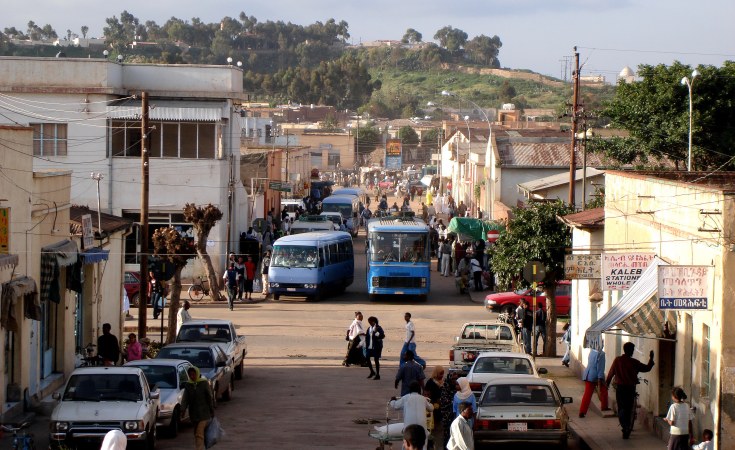With a series of events in the past year suggesting change could be afoot, the time is ripe for renewed attention on Ethiopia-Eritrea relations.
Eritrea is with some frequency referred to as "The North Korea of Africa". However, this analogy is not helpful for understanding Eritrea. Moreover, and worse, it serves to obscure dynamics which would be helpful in understanding the country.
On the surface, comparisons are apparently drawn between the two countries because of two main factors. First, there is the size of the standing army relative to the population. In recent league tables, Eritrea registers as second behind North Korea.
The second aspect of the comparison relates to the perception of both countries as 'closed': this presumably includes features such as a restrictive media environment, limited diplomatic relations and a role as a regional 'spoiler'.
I am not an expert on North Korea, but it seems clear that any comparison between North Korea and Eritrea falls apart fairly swiftly, even at a surface level.
Regarding their geopolitical and security dynamics, for example, North Korea is a nuclear armed state with the capacity to deliver a missile payload in striking distance of South Korea, Japan and China (three of the most significant economies on the planet).
It has fought a war against the United States, and the subsequent stalemate has seen tens of thousands of US troops stationed near its border - a legacy of the Cold War, but clearly a high-profile item on the US, Chinese, Japanese and other major powers' security agendas.
Compare this with Eritrea, a small country with extremely limited military capacity, located in the Horn of Africa - a strategically significant region to be sure, but nothing on the scale of the nexus of security and economic interests represented by the Korean peninsula.
Additionally, as far as I can tell, the most salient aspect of a Western audience's 'understanding' of North Korea is that it is a closed country about which very little is known, but which has poor relations with its neighbours and the West. So does the analogy only tell us that we understand Eritrea poorly? Is this not where we started?
Shifting positions in the Horn of Africa
While the comparison may be most useful in simply telling us that Eritrea is understood poorly and in mostly in the form of vague assumptions, recent developments in the Horn of Africa suggest that it might be time to question some of those long-held assumptions - regarding relations between countries in the Horn, whether there is the prospect for improvement (or sudden shifts in unexpected directions), and who can and cannot be worked with.
Ideas around these issues have been in place for several years after efforts to see through the 2000 Algiers Peace Agreement between Eritrea and Ethiopia faltered, and, from about 2005, the focus of external attention towards the Horn of Africa shifted towards Sudan and Somalia. But a string of events in the last year or so has contributed to the sense that things could change again.
First, there were signals that Ethiopia's posture towards its neighbour might be taking a more robust tone.
In early 2012, a botched kidnapping/extortion attempt in the Afar region, straddling the Eritrean border area, resulted in the deaths of five tourists including foreigners and their local tour guides. Ethiopia attributed the incident to Eritrean-backed rebels, and conducted two rounds of air strikes inside Eritrean territory in retaliation.
The Eritrean response was extremely muted given the scale of the Ethiopian strikes.
In April, a rumour circulated that Eritrean President Isaias Afewerki had died; Isaias dispelled the rumours after about a week with a media appearance. Nevertheless, the rumours led observers to consider - albeit briefly - what a transition might look like if Eritrea's leadership were to suddenly shift.
In June, Ethiopian Prime Minister Meles Zenawi disappeared from public view, and his death was eventually announced in late August, leading to a protracted period of political uncertainty as the ruling EPRDF party conducted internal discussions as to how to handle the transition.
The ascension of Deputy Prime Minister Hailemariam Desalegn to the premiership has been accompanied by signals from the government of continuity with the trajectory set by Meles. However, the posture towards Eritrea appears to have softened somewhat.
In October, two pilots defected to Saudi Arabia with President Isaias's official aircraft (a third pilot, sent to retrieve the plane, reportedly also defected this week).
In November, Information Minister Ali Abdu reportedly defected, and is currently understood to be based in Australia, perhaps seeking asylum.
November also saw the defection of the national football team, which was in Uganda for a match. None of these events is hugely significant in terms of the individuals involved, but they were high-profile developments which underscore the extent to which all is not static inside the government.
In late January, soldiers apparently occupied the Ministry of Information in Asmara, and briefly commandeered the state television broadcaster.
A short message was reportedly read, calling for the implementation of the country's constitution and the release of political prisoners before the broadcast was cut, and the soldiers were eventually returned to their barracks.
Such a transparent challenge to the authority of the government in Asmara has not taken place inside Eritrea in at least a decade. At the very least, this suggests to me that some shifts in the Eritrean government's internal dynamics are underway.
In all likelihood, these shifts have been underway for some time, albeit overshadowed by more high-profile developments in neighbouring countries. As such, the time is ripe for renewed attention to the neglected issue of Ethiopia and Eritrea's relations.
In a fragile region, the prospect of change - positive or negative - in this relationship should be a point of concern for both neighbouring countries and external players with strategic or commercial interests in the Horn of Africa.
Jason Mosley is a Research Associate at the African Studies Centre, Oxford University. Follow him on twitter @AfricaUpdate


